Xuanhe Zhou
Can LLMs Clean Up Your Mess? A Survey of Application-Ready Data Preparation with LLMs
Jan 22, 2026Abstract:Data preparation aims to denoise raw datasets, uncover cross-dataset relationships, and extract valuable insights from them, which is essential for a wide range of data-centric applications. Driven by (i) rising demands for application-ready data (e.g., for analytics, visualization, decision-making), (ii) increasingly powerful LLM techniques, and (iii) the emergence of infrastructures that facilitate flexible agent construction (e.g., using Databricks Unity Catalog), LLM-enhanced methods are rapidly becoming a transformative and potentially dominant paradigm for data preparation. By investigating hundreds of recent literature works, this paper presents a systematic review of this evolving landscape, focusing on the use of LLM techniques to prepare data for diverse downstream tasks. First, we characterize the fundamental paradigm shift, from rule-based, model-specific pipelines to prompt-driven, context-aware, and agentic preparation workflows. Next, we introduce a task-centric taxonomy that organizes the field into three major tasks: data cleaning (e.g., standardization, error processing, imputation), data integration (e.g., entity matching, schema matching), and data enrichment (e.g., data annotation, profiling). For each task, we survey representative techniques, and highlight their respective strengths (e.g., improved generalization, semantic understanding) and limitations (e.g., the prohibitive cost of scaling LLMs, persistent hallucinations even in advanced agents, the mismatch between advanced methods and weak evaluation). Moreover, we analyze commonly used datasets and evaluation metrics (the empirical part). Finally, we discuss open research challenges and outline a forward-looking roadmap that emphasizes scalable LLM-data systems, principled designs for reliable agentic workflows, and robust evaluation protocols.
Lost in Tokenization: Context as the Key to Unlocking Biomolecular Understanding in Scientific LLMs
Oct 27, 2025Abstract:Scientific Large Language Models (Sci-LLMs) have emerged as a promising frontier for accelerating biological discovery. However, these models face a fundamental challenge when processing raw biomolecular sequences: the tokenization dilemma. Whether treating sequences as a specialized language, risking the loss of functional motif information, or as a separate modality, introducing formidable alignment challenges, current strategies fundamentally limit their reasoning capacity. We challenge this sequence-centric paradigm by positing that a more effective strategy is to provide Sci-LLMs with high-level structured context derived from established bioinformatics tools, thereby bypassing the need to interpret low-level noisy sequence data directly. Through a systematic comparison of leading Sci-LLMs on biological reasoning tasks, we tested three input modes: sequence-only, context-only, and a combination of both. Our findings are striking: the context-only approach consistently and substantially outperforms all other modes. Even more revealing, the inclusion of the raw sequence alongside its high-level context consistently degrades performance, indicating that raw sequences act as informational noise, even for models with specialized tokenization schemes. These results suggest that the primary strength of existing Sci-LLMs lies not in their nascent ability to interpret biomolecular syntax from scratch, but in their profound capacity for reasoning over structured, human-readable knowledge. Therefore, we argue for reframing Sci-LLMs not as sequence decoders, but as powerful reasoning engines over expert knowledge. This work lays the foundation for a new class of hybrid scientific AI agents, repositioning the developmental focus from direct sequence interpretation towards high-level knowledge synthesis. The code is available at github.com/opendatalab-raise-dev/CoKE.
MinerU2.5: A Decoupled Vision-Language Model for Efficient High-Resolution Document Parsing
Sep 26, 2025Abstract:We introduce MinerU2.5, a 1.2B-parameter document parsing vision-language model that achieves state-of-the-art recognition accuracy while maintaining exceptional computational efficiency. Our approach employs a coarse-to-fine, two-stage parsing strategy that decouples global layout analysis from local content recognition. In the first stage, the model performs efficient layout analysis on downsampled images to identify structural elements, circumventing the computational overhead of processing high-resolution inputs. In the second stage, guided by the global layout, it performs targeted content recognition on native-resolution crops extracted from the original image, preserving fine-grained details in dense text, complex formulas, and tables. To support this strategy, we developed a comprehensive data engine that generates diverse, large-scale training corpora for both pretraining and fine-tuning. Ultimately, MinerU2.5 demonstrates strong document parsing ability, achieving state-of-the-art performance on multiple benchmarks, surpassing both general-purpose and domain-specific models across various recognition tasks, while maintaining significantly lower computational overhead.
ST-Raptor: LLM-Powered Semi-Structured Table Question Answering
Aug 25, 2025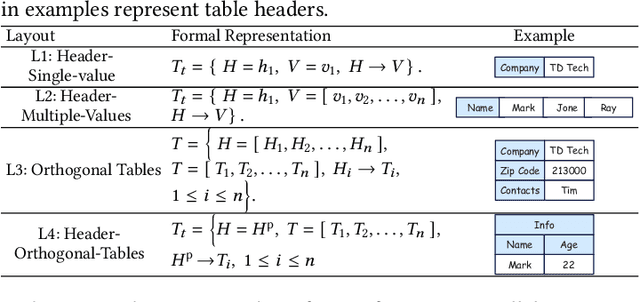

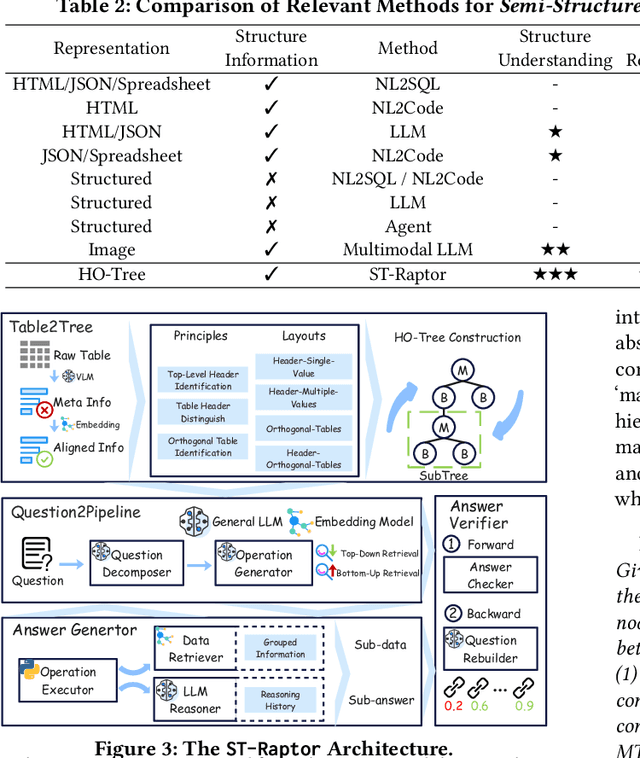
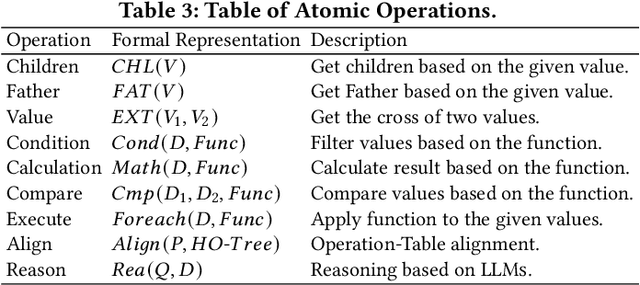
Abstract:Semi-structured tables, widely used in real-world applications (e.g., financial reports, medical records, transactional orders), often involve flexible and complex layouts (e.g., hierarchical headers and merged cells). These tables generally rely on human analysts to interpret table layouts and answer relevant natural language questions, which is costly and inefficient. To automate the procedure, existing methods face significant challenges. First, methods like NL2SQL require converting semi-structured tables into structured ones, which often causes substantial information loss. Second, methods like NL2Code and multi-modal LLM QA struggle to understand the complex layouts of semi-structured tables and cannot accurately answer corresponding questions. To this end, we propose ST-Raptor, a tree-based framework for semi-structured table question answering using large language models. First, we introduce the Hierarchical Orthogonal Tree (HO-Tree), a structural model that captures complex semi-structured table layouts, along with an effective algorithm for constructing the tree. Second, we define a set of basic tree operations to guide LLMs in executing common QA tasks. Given a user question, ST-Raptor decomposes it into simpler sub-questions, generates corresponding tree operation pipelines, and conducts operation-table alignment for accurate pipeline execution. Third, we incorporate a two-stage verification mechanism: forward validation checks the correctness of execution steps, while backward validation evaluates answer reliability by reconstructing queries from predicted answers. To benchmark the performance, we present SSTQA, a dataset of 764 questions over 102 real-world semi-structured tables. Experiments show that ST-Raptor outperforms nine baselines by up to 20% in answer accuracy. The code is available at https://github.com/weAIDB/ST-Raptor.
A Survey of LLM $\times$ DATA
May 24, 2025Abstract:The integration of large language model (LLM) and data management (DATA) is rapidly redefining both domains. In this survey, we comprehensively review the bidirectional relationships. On the one hand, DATA4LLM, spanning large-scale data processing, storage, and serving, feeds LLMs with high quality, diversity, and timeliness of data required for stages like pre-training, post-training, retrieval-augmented generation, and agentic workflows: (i) Data processing for LLMs includes scalable acquisition, deduplication, filtering, selection, domain mixing, and synthetic augmentation; (ii) Data Storage for LLMs focuses on efficient data and model formats, distributed and heterogeneous storage hierarchies, KV-cache management, and fault-tolerant checkpointing; (iii) Data serving for LLMs tackles challenges in RAG (e.g., knowledge post-processing), LLM inference (e.g., prompt compression, data provenance), and training strategies (e.g., data packing and shuffling). On the other hand, in LLM4DATA, LLMs are emerging as general-purpose engines for data management. We review recent advances in (i) data manipulation, including automatic data cleaning, integration, discovery; (ii) data analysis, covering reasoning over structured, semi-structured, and unstructured data, and (iii) system optimization (e.g., configuration tuning, query rewriting, anomaly diagnosis), powered by LLM techniques like retrieval-augmented prompting, task-specialized fine-tuning, and multi-agent collaboration.
CrackSQL: A Hybrid SQL Dialect Translation System Powered by Large Language Models
Apr 01, 2025Abstract:Dialect translation plays a key role in enabling seamless interaction across heterogeneous database systems. However, translating SQL queries between different dialects (e.g., from PostgreSQL to MySQL) remains a challenging task due to syntactic discrepancies and subtle semantic variations. Existing approaches including manual rewriting, rule-based systems, and large language model (LLM)-based techniques often involve high maintenance effort (e.g., crafting custom translation rules) or produce unreliable results (e.g., LLM generates non-existent functions), especially when handling complex queries. In this demonstration, we present CrackSQL, the first hybrid SQL dialect translation system that combines rule and LLM-based methods to overcome these limitations. CrackSQL leverages the adaptability of LLMs to minimize manual intervention, while enhancing translation accuracy by segmenting lengthy complex SQL via functionality-based query processing. To further improve robustness, it incorporates a novel cross-dialect syntax embedding model for precise syntax alignment, as well as an adaptive local-to-global translation strategy that effectively resolves interdependent query operations. CrackSQL supports three translation modes and offers multiple deployment and access options including a web console interface, a PyPI package, and a command-line prompt, facilitating adoption across a variety of real-world use cases
FeatInsight: An Online ML Feature Management System on 4Paradigm Sage-Studio Platform
Apr 01, 2025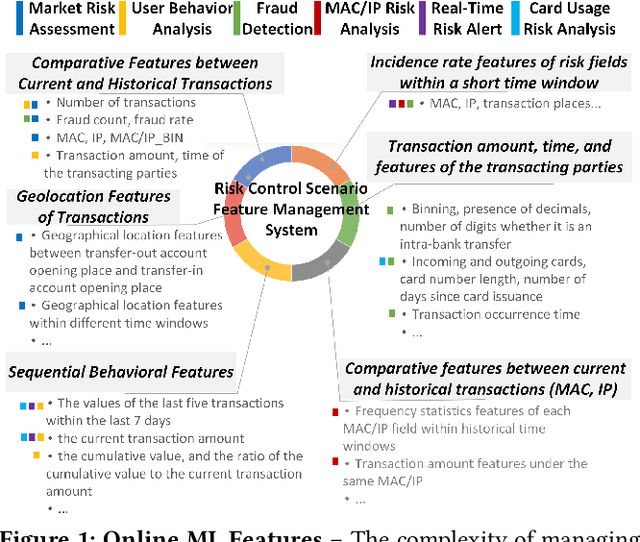
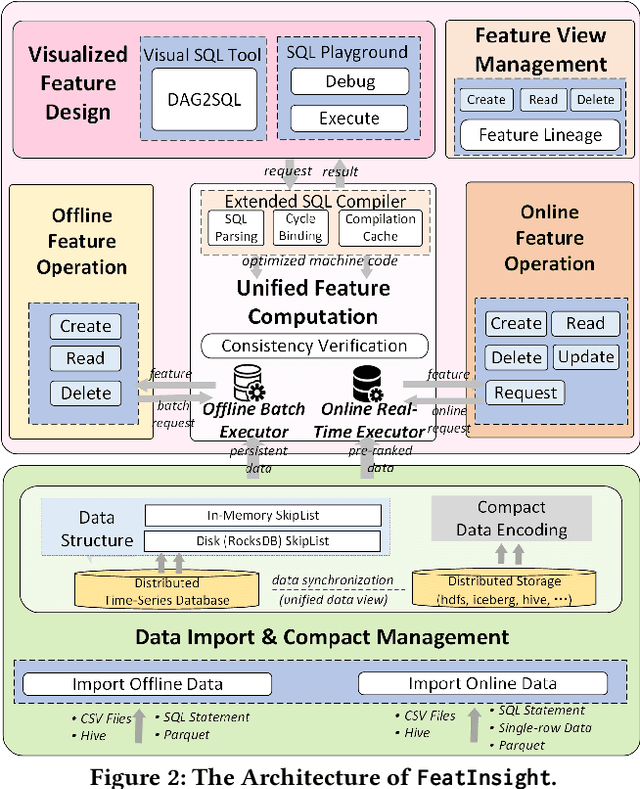
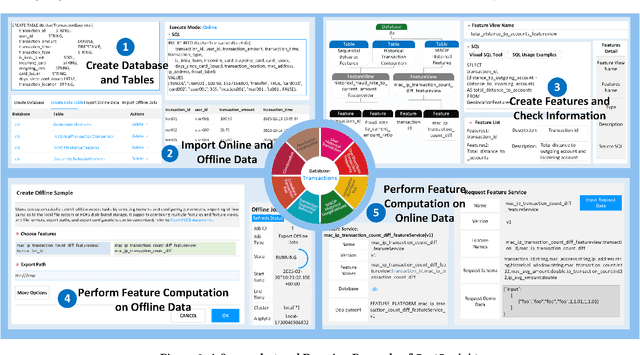
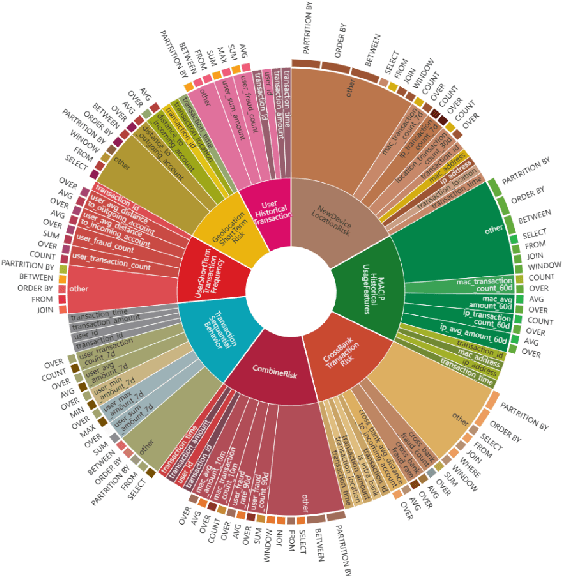
Abstract:Feature management is essential for many online machine learning applications and can often become the performance bottleneck (e.g., taking up to 70% of the overall latency in sales prediction service). Improper feature configurations (e.g., introducing too many irrelevant features) can severely undermine the model's generalization capabilities. However, managing online ML features is challenging due to (1) large-scale, complex raw data (e.g., the 2018 PHM dataset contains 17 tables and dozens to hundreds of columns), (2) the need for high-performance, consistent computation of interdependent features with complex patterns, and (3) the requirement for rapid updates and deployments to accommodate real-time data changes. In this demo, we present FeatInsight, a system that supports the entire feature lifecycle, including feature design, storage, visualization, computation, verification, and lineage management. FeatInsight (with OpenMLDB as the execution engine) has been deployed in over 100 real-world scenarios on 4Paradigm's Sage Studio platform, handling up to a trillion-dimensional feature space and enabling millisecond-level feature updates. We demonstrate how FeatInsight enhances feature design efficiency (e.g., for online product recommendation) and improve feature computation performance (e.g., for online fraud detection). The code is available at https://github.com/4paradigm/FeatInsight.
OpenMLDB: A Real-Time Relational Data Feature Computation System for Online ML
Jan 15, 2025



Abstract:Efficient and consistent feature computation is crucial for a wide range of online ML applications. Typically, feature computation is divided into two distinct phases, i.e., offline stage for model training and online stage for model serving. These phases often rely on execution engines with different interface languages and function implementations, causing significant inconsistencies. Moreover, many online ML features involve complex time-series computations (e.g., functions over varied-length table windows) that differ from standard streaming and analytical queries. Existing data processing systems (e.g., Spark, Flink, DuckDB) often incur multi-second latencies for these computations, making them unsuitable for real-time online ML applications that demand timely feature updates. This paper presents OpenMLDB, a feature computation system deployed in 4Paradigm's SageOne platform and over 100 real scenarios. Technically, OpenMLDB first employs a unified query plan generator for consistent computation results across the offline and online stages, significantly reducing feature deployment overhead. Second, OpenMLDB provides an online execution engine that resolves performance bottlenecks caused by long window computations (via pre-aggregation) and multi-table window unions (via data self-adjusting). It also provides a high-performance offline execution engine with window parallel optimization and time-aware data skew resolving. Third, OpenMLDB features a compact data format and stream-focused indexing to maximize memory usage and accelerate data access. Evaluations in testing and real workloads reveal significant performance improvements and resource savings compared to the baseline systems. The open community of OpenMLDB now has over 150 contributors and gained 1.6k stars on GitHub.
R-Bot: An LLM-based Query Rewrite System
Dec 02, 2024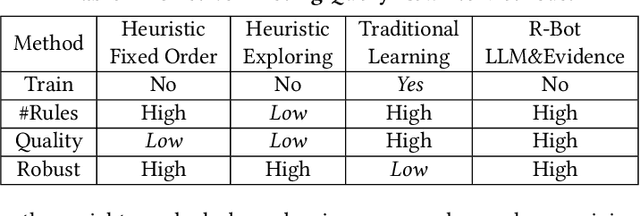
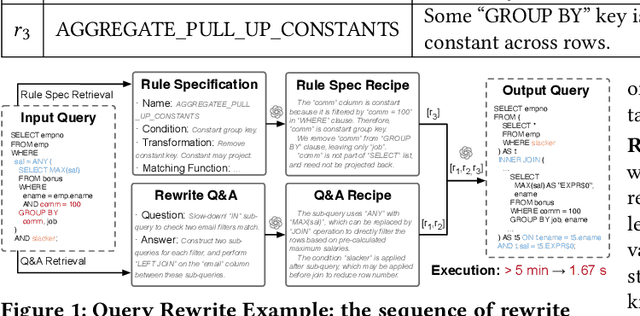
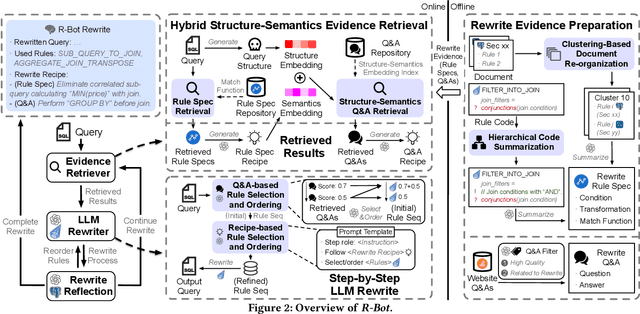
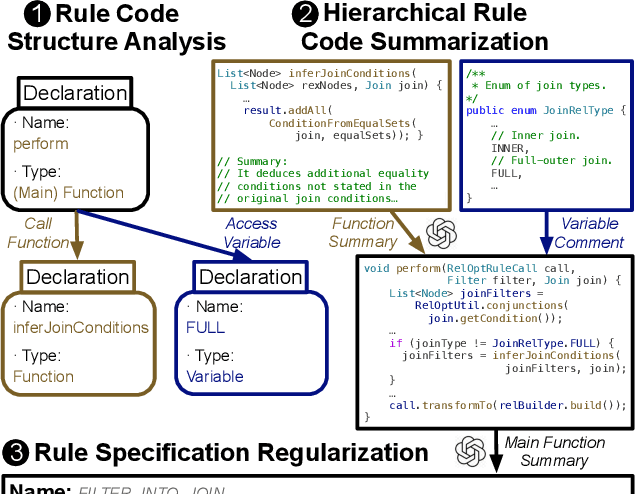
Abstract:Query rewrite is essential for optimizing SQL queries to improve their execution efficiency without changing their results. Traditionally, this task has been tackled through heuristic and learning-based methods, each with its limitations in terms of inferior quality and low robustness. Recent advancements in LLMs offer a new paradigm by leveraging their superior natural language and code comprehension abilities. Despite their potential, directly applying LLMs like GPT-4 has faced challenges due to problems such as hallucinations, where the model might generate inaccurate or irrelevant results. To address this, we propose R-Bot, an LLM-based query rewrite system with a systematic approach. We first design a multi-source rewrite evidence preparation pipeline to generate query rewrite evidences for guiding LLMs to avoid hallucinations. We then propose a hybrid structure-semantics retrieval method that combines structural and semantic analysis to retrieve the most relevant rewrite evidences for effectively answering an online query. We next propose a step-by-step LLM rewrite method that iteratively leverages the retrieved evidences to select and arrange rewrite rules with self-reflection. We conduct comprehensive experiments on widely used benchmarks, and demonstrate the superior performance of our system, R-Bot, surpassing state-of-the-art query rewrite methods.
Revolutionizing Database Q&A with Large Language Models: Comprehensive Benchmark and Evaluation
Sep 05, 2024
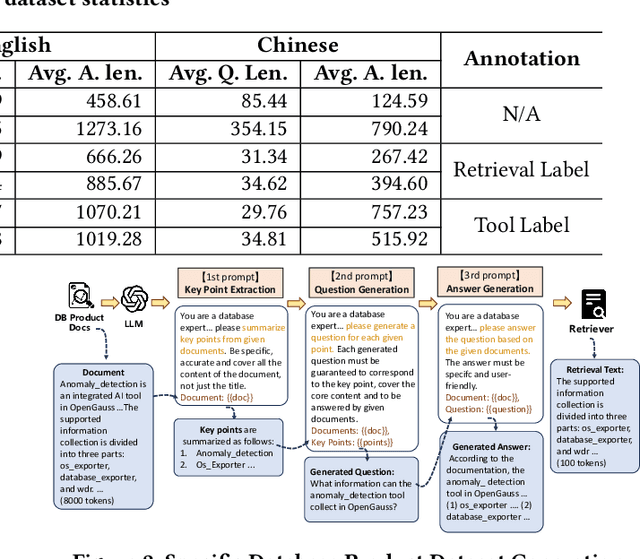
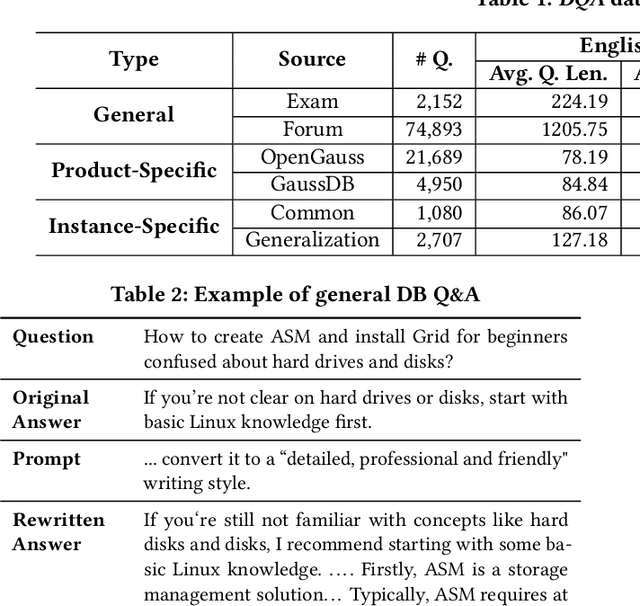

Abstract:The development of Large Language Models (LLMs) has revolutionized Q&A across various industries, including the database domain. However, there is still a lack of a comprehensive benchmark to evaluate the capabilities of different LLMs and their modular components in database Q&A. To this end, we introduce DQA, the first comprehensive database Q&A benchmark. DQA features an innovative LLM-based method for automating the generation, cleaning, and rewriting of database Q&A, resulting in over 240,000 Q&A pairs in English and Chinese. These Q&A pairs cover nearly all aspects of database knowledge, including database manuals, database blogs, and database tools. This inclusion allows for additional assessment of LLMs' Retrieval-Augmented Generation (RAG) and Tool Invocation Generation (TIG) capabilities in the database Q&A task. Furthermore, we propose a comprehensive LLM-based database Q&A testbed on DQA. This testbed is highly modular and scalable, with both basic and advanced components like Question Classification Routing (QCR), RAG, TIG, and Prompt Template Engineering (PTE). Besides, DQA provides a complete evaluation pipeline, featuring diverse metrics and a standardized evaluation process to ensure comprehensiveness, accuracy, and fairness. We use DQA to evaluate the database Q&A capabilities under the proposed testbed comprehensively. The evaluation reveals findings like (i) the strengths and limitations of nine different LLM-based Q&A bots and (ii) the performance impact and potential improvements of various service components (e.g., QCR, RAG, TIG). We hope our benchmark and findings will better guide the future development of LLM-based database Q&A research.
 Add to Chrome
Add to Chrome Add to Firefox
Add to Firefox Add to Edge
Add to Edge